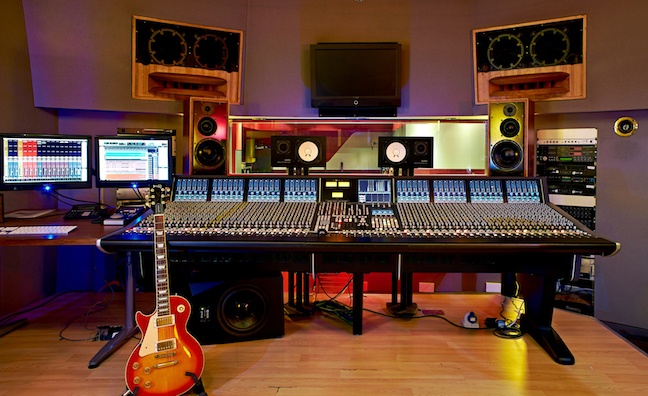New research from the Music Producers Guild shows that 48% of commercial recording studios could go out of business within three months, unless they receive further support from the government.
As revealed in the latest issue of Music Week, the MPG has surveyed the studio sector and discovered the full extent of the impact during the Covid-19 lockdown.
But the government announced a further £617m in grants for small companies at the weekend.
The MPG has called for business rates relief and grants to be extended to recording studios, warning that unless the government steps in, many facilities could be lost for good.
“The UK has some of the finest recording studios in the world, but unless the government steps in with immediate support, half of those studios won’t be around when things get back to normal, and the knock-on effects on the wider industry will be disastrous,” said MPG executive director Olga FitzRoy. “We welcome the new grant announced on Saturday, but we have yet to see the details. The Culture Secretary recently said he wanted to protect ‘core architecture’ in the creative industries. If the studios like Dean Street, where Bowie recorded Ashes to Ashes aren’t considered worth saving, then I don’t know what is.”
David Bowie recorded at Dean St in its previous incarnation as Tony Visconti’s Good Earth studios. The studios have played host to sessions by Bowie, The Smiths, and Tina Turner and more recently Florence and the Machine and Adele.
Dean St (pictured) is facing huge challenges because of the loss of income while having to cover many ongoing costs, including business rates.
Jasmin Lee, managing director of Dean Street Studios, said: “Studios seem to be bottom of the food chain in the music industry, always being beaten down on rates. For those of us who are independent, it’s always hand to mouth on the finances. Many of us have put our life savings into starting our studios and keeping our doors open.”
James Johnston, engineer and Cowshed Studios owner, said: “It has been open since 1975 and I have serious worries about not being able to survive after the next three to four months without any clients able to come in or hire the studio. I may be able to do some mixing and remote drum tracking, but as my clients are all in the same boat unable to work they probably can't afford to pay for my services, even at cut price rates. I will try and I am determined not to give up on such a historic well loved and unique studio.”
The UK has some of the finest recording studios in the world, but unless the government steps in with immediate support, half of those studios won’t be around when things get back to normal
Olga FitzRoy
Studios have closed their doors like other businesses. Unlike live venues, though, they have not benefited from any of the business rates holidays or associated grants that were announced following the lockdown.
Engineers and producers who rent production rooms are also struggling, with 73% stating they will only be able to remain open for three months or less under current conditions. Many are now relying on landlords and local authorities to give them discretionary discounts.
The MPG survey also showed that 6% of commercial studios would close within one month without further support, while 48% will close within three months without additional support from government. Only 22% have been able to negotiate a rent reduction from their landlord.
The Music Producers Guild has called for business rates relief and grants to be extended to recording studios, warning that unless the government steps in, many facilities could be lost for good.
The MPG is also campaigning to improve access to the government’s CBILS loan scheme.
“I know of no studios who have been able to access a loan,” said FitzRoy. “Banks are refusing to lend, or only offering commercial packages at interest rates of 18-20%. And many are put off by needing to pay commercial rates after 12 months, and are contemplating closing their business rather than running up debts they can’t repay. The new ‘Bounce Back’ loan scheme is a step in the right direction, but the government must increase the interest-free period to 24 months to give studios and engineers a fighting chance of recovery”
The survey showed that 37% felt the minimum interest-free period for a government loan to be useful would be 24 months, while 20% felt 36 months would be effective. Only 13% felt the current interest free period of 12 months was long enough to be useful.
FitzRoy was a winner at last year’s Music Week Awards in recognition of her campaigning on shared parental leave for freelancers.
To read the full report on how Covid-19 is impacting the studio sector, subscribers can click here. And click here to read a personal account by Substation studio owner and manager Michael Brennan.
To subscribe and never miss a big industry story, click here.
* To make sure you can access Music Week wherever you are, subscribe to our digital issue by clicking here.











